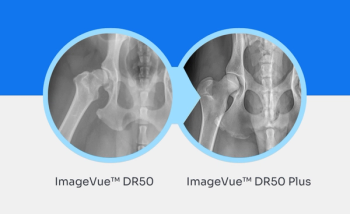
- dvm360 February 2024
- Volume 55
- Issue 2
- Pages: 19
New study shows blood test detects residual disease and cancer recurrence
The investigation clinically validated the OncoK9 test from PetDx, reinforcing previous study results.
The results of a newly published study reinforce that a multicancer early detection test for dogs (OncoK9, PetDx) using next-generation sequencing (NGS) technology can detect genomic alterations indicative of residual disease and cancer recurrence in cell-free DNA of dogs previously treated by surgery for a variety of cancer types. The study published in the American Journal of Veterinary Research (AJVR) evaluated OncoK9 test results from blood samples collected prospectively between 2019 and 2022 as well as corresponding clinical management and outcome data.1
Fifty-two dogs that had received a definitive cancer diagnosis across 12 different cancer types and had previously been enrolled in
"The goal of residual disease detection and recurrence monitoring is to allow for a more individualized approach to cancer care," said Brian Flesner, DVM, MS, DACVIM (Oncology), director of clinical oncology, PetDx, in an organizational release.1 "The current approach to postdiagnosis follow-up for most aggressive cancers involves serial imaging studies. Detection of molecular disease by the OncoK9 test gives veterinarians a tool that may allow for earlier intervention before signs of the disease are evident, with the hope of changing a patient's clinical management and improving prognosis. Our multiyear longitudinal study documents, for the first time, the application of this NGS technology for cancer monitoring in veterinary medicine."
The new investigation found that following excisional surgery, patients with an OncoK9 test result detecting a cancer signal at the postoperative visit were approximately twice as likely to have clinical recurrence within 6 months compared to patients with no cancer signal detected with the test. By comparison of these test results, there was no significant difference in cancer recurrence within 6 months based on traditional histologic margin assessment. Furthermore, among patients treated for cancer that experienced clinical recurrence during the study period, 82% had an OncoK9 test result that detected a cancer signal prior to or concomitant with clinical recurrence, and in more than half of these patients, "molecular recurrence" was detected prior to clinical recurrence, with a median lead time of over 5 months.1
"Over the past few years, PetDx has established a leadership position in blood-based veterinary cancer diagnostics through extensive and well-executed research and development initiatives," said Alejandro Bernal, DVM, MS, MBA, president and CEO of PetDx, in the release.1 "This latest study represents an important addition to our scientific portfolio and indicates that OncoK9 can be used by veterinarians as a noninvasive adjunct tool to manage cancer patients in the post-diagnosis setting."
The study’s authors include Flesner; Angela L. McCleary-Wheeler, DVM, PhD, DACVIM (Oncology); Patrick C. Fiaux, PhD; Carlos A. Ruiz-Perez, PhD; Lisa M. McLennan; John A. Tynan, PhD; Susan C. Hicks, MAS; Jill M. Rafalko, MS; Daniel S. Grosu, MD, MBA; Jason Chibuk, MS; Allison L. O’Kell, DVM, MS, DACVIM (SAIM); Todd A. Cohen, DVM, DACVIM (SAIM); Ilya Chorny, PhD; Dana W.Y. TSui, PhD: Kristina M. Kruglyak, PhD; and Andi Flory; DVM, DACVIM (Oncology). All of the authors are current or former employees of PetDx and adhered to AJVR policies for publication.2
References
- OncoK9 Liquid Biopsy test can be used for cancer monitoring in dogs across a variety of cancer types, AJVR publication shows. News release. PetDx. December 28, 2023. Accessed December 28, 2023.
https://www.prnewswire.com/news-releases/oncok9-liquid-biopsy-test-can-be-used-for-cancer-monitoring-in-dogs-across-a-variety-of-cancer-types-ajvr-publication-shows-302023277.html - McCleary-Wheeler AL, Fiaux PC, Flesner BK, et al. Next-generation sequencing-based liquid biopsy may be used for detection of residual disease and cancer recurrence monitoring in dogs. Am J Vet Res. December 28, 2023. Accessed December 29, 2023.
https://avmajournals.avma.org/view/journals/ajvr/aop/ajvr.23.07.0163/ajvr.23.07.0163.xml
Articles in this issue
almost 2 years ago
dvm360® product report: Mobility products, plus cat toothbrush, and morealmost 2 years ago
How to approach pet dental care year-roundalmost 2 years ago
How to apply a phalangeal cast in horsesalmost 2 years ago
AI vs burnoutalmost 2 years ago
Noteworthy news: Fetch conference is headed to Nashvillealmost 2 years ago
Beyond-use dates: Ready or not, USP guidelines will impact your practicealmost 2 years ago
The interviewalmost 2 years ago
It’s “tooth-thirty.” Do you know where your instruments are?almost 2 years ago
AI-powered diagnostics providing individualized patient careabout 2 years ago
Preventing canine parvovirus infectionNewsletter
From exam room tips to practice management insights, get trusted veterinary news delivered straight to your inbox—subscribe to dvm360.





